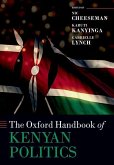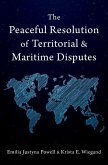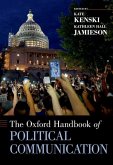The Oxford Handbook of Peaceful Change in International Relations
Herausgeber: Paul, T V; Emmers, Ralf; Wivel, Anders; Trinkunas, Harold A; Larson, Deborah Welch
The Oxford Handbook of Peaceful Change in International Relations
Herausgeber: Paul, T V; Emmers, Ralf; Wivel, Anders; Trinkunas, Harold A; Larson, Deborah Welch
- Gebundenes Buch
- Merkliste
- Auf die Merkliste
- Bewerten Bewerten
- Teilen
- Produkt teilen
- Produkterinnerung
- Produkterinnerung
This work provides a thorough examination of research on the problem of change in the international arena and the reasons why change happens peacefully at times, and at others, violently. It contains over forty chapters, which examine the historical, theoretical, global, regional, and national foreign-policy dimensions of peaceful change. As the world enters a new round of power transition conflict, involving a rapidly rising China and a relatively declining United States, this Handbook provides a necessary resource for decisionmakers and scholars engaged in this vital area of research.
![Oxford Handbook of Peacebuilding, Statebuilding, and Peace Formation Oxford Handbook of Peacebuilding, Statebuilding, and Peace Formation]() Oliver P RichmondOxford Handbook of Peacebuilding, Statebuilding, and Peace Formation183,99 €
Oliver P RichmondOxford Handbook of Peacebuilding, Statebuilding, and Peace Formation183,99 €![The Oxford Handbook of Japanese Politics The Oxford Handbook of Japanese Politics]() The Oxford Handbook of Japanese Politics214,99 €
The Oxford Handbook of Japanese Politics214,99 €![The Oxford Handbook of Electoral Systems The Oxford Handbook of Electoral Systems]() The Oxford Handbook of Electoral Systems67,99 €
The Oxford Handbook of Electoral Systems67,99 €![The Oxford Handbook of Kenyan Politics The Oxford Handbook of Kenyan Politics]() The Oxford Handbook of Kenyan Politics57,99 €
The Oxford Handbook of Kenyan Politics57,99 €![The Oxford Handbook of Digital Diplomacy The Oxford Handbook of Digital Diplomacy]() Corneliu BjolaThe Oxford Handbook of Digital Diplomacy191,99 €
Corneliu BjolaThe Oxford Handbook of Digital Diplomacy191,99 €![The Peaceful Resolution of Territorial and Maritime Disputes The Peaceful Resolution of Territorial and Maritime Disputes]() Emilia Justyna Powell (Professor, Professor, University of Notre DaThe Peaceful Resolution of Territorial and Maritime Disputes92,99 €
Emilia Justyna Powell (Professor, Professor, University of Notre DaThe Peaceful Resolution of Territorial and Maritime Disputes92,99 €![The Oxford Handbook of Political Communication The Oxford Handbook of Political Communication]() The Oxford Handbook of Political Communication67,99 €
The Oxford Handbook of Political Communication67,99 €-
-
-
- Produktdetails
- Oxford Handbooks
- Verlag: Oxford University Press Inc
- Seitenzahl: 840
- Erscheinungstermin: 19. August 2021
- Englisch
- Abmessung: 249mm x 186mm x 55mm
- Gewicht: 1584g
- ISBN-13: 9780190097356
- ISBN-10: 0190097353
- Artikelnr.: 62353987
- Oxford Handbooks
- Verlag: Oxford University Press Inc
- Seitenzahl: 840
- Erscheinungstermin: 19. August 2021
- Englisch
- Abmessung: 249mm x 186mm x 55mm
- Gewicht: 1584g
- ISBN-13: 9780190097356
- ISBN-10: 0190097353
- Artikelnr.: 62353987
* 1. The Study of Peaceful Change in World Politics
* T. V. Paul
* Part II: Historical Perspectives
* 2. Peaceful Change: The Inter-War Era and the Disciplinary Context
* Torbjørn L. Knutsen
* 3. Peaceful Change after the World Wars
* Peter Marcus Kristensen
* 4. Peaceful Change: The Post-Cold War Evolution
* Jeffrey W. Taliaferro
* Part III: Theoretical Perspectives
* 5. Realism and Peaceful Change: A Structural and Neoclassical Realist
First-Cut
* Joshua Shifrinson
* 6. Liberalism and Peaceful Change
* Alexandra Gheciu
* 7. International Institutions and Peaceful Change
* Frédéric Mérand and Vincent Pouliot
* 8. Economic Interdependence, Globalization, and Peaceful Change
* John Ravenhill
* 9. Constructivism and Peaceful Change
* Erna Burai and Stephanie C. Hofmann
* 10. Peaceful Change in English School Theory: Great Power Management
and Regional Order
* Cornelia Navari
* 11. Critical Theories and Change in International Relations
* Annette Freyberg-Inan
* 12. Gender and Peaceful Change
* Karin Aggestam and Annika Bergman Rosamond
* 13. Civilization, Religion, and Peaceful and Non-Peaceful Change in
Asia
* Victoria Tin-bor Hui
* 14. Evolutionary Theorization of Peaceful International Changes
* Shiping Tang
* Part IV: The Sources of Change
* 15. International Law and Peaceful Change
* Jennifer M. Welsh
* 16. Nuclear Weapons and Peaceful Change
* Michal Smetana
* 17. The Political Economy of Peaceful Change
* Lars S. Skålnes
* 18. Climate Change, Collective Action, and Peaceful Change
* Ashok Swain
* 19. Democracy, Global Governance, and Peaceful Change
* Thomas Davies
* 20. Status Quest and Peaceful Change
* Xiaoyu Pu
* 21. Science, Technology, and Peaceful Change in World Politics
* Anne L. Clunan
* 22. Transnational Social Movements and Peaceful Change
* Alejandro Milcíades Peña
* Part V: Great Powers, Rising Powers, and Peaceful Change
* 23. Peaceful Change in US Foreign Policy
* Deborah Welch Larson
* 24. China's Peaceful Rise: From Narrative to Practice
* Kai He and Feng Liu
* 25. Russia and Peaceful Change: From Gorbachev to Putin
* Andrej Krickovic
* 26. Germany and Peaceful Change
* Klaus Brummer
* 27. Japan and Peaceful Change in the International System: The
Persistent Peace Nation
* Thomas U. Berger
* 28. India and Peaceful Change
* Manjeet S. Pardesi
* 29. South Africa and the Idea of Peaceful Change
* Peter Vale
* 30. Indonesia's Contributions to Peaceful Change in International
Affairs
* Dewi Fortuna Anwar
* Part VI: Regional Perspectives
* 31. Peaceful Change in Western Europe: From Balance of Power to
Political Community?
* Anders Wivel
* 32. Origins and Evolution of the North American Stable Peace
* David G. Haglund
* 33. Latin America's Evolving Contribution to Peaceful Change in the
International System: A Stony Road
* Harold A. Trinkunas
* 34. Peaceful Change in Africa
* Markus Kornprobst
* 35. Peaceful Change in Southeast Asia: The Historical and
Institutional Bases
* Ralf Emmers and Mely Caballero-Anthony
* 36. South Asia: Limited Progress toward Peaceful Change
* Rajesh Basrur and Kate Sullivan de Estrada
* 37. Peaceful Change in Northeast Asia: Maintaining the "Minimal
Peace"
* Bhubhindar Singh
* 38. The Middle East and Peaceful Change
* Arie M. Kacowicz and Galia Press-Barnathan
* 39. Explaining Peaceful Change in Central and Eastern Europe
* Alexander Tabachnik and Benjamin Miller
* 40. Central Asia: A Decolonial Perspective on Peaceful Change
* Timur Dadabaev and John Heathershaw
* Part VII: Conclusions
* 41. A Research Agenda for the Study of Peaceful Change in World
Politics
* Deborah Welch Larson, T. V. Paul, Harold A. Trinkunas, Anders Wivel,
and Ralf Emmers
* 1. The Study of Peaceful Change in World Politics
* T. V. Paul
* Part II: Historical Perspectives
* 2. Peaceful Change: The Inter-War Era and the Disciplinary Context
* Torbjørn L. Knutsen
* 3. Peaceful Change after the World Wars
* Peter Marcus Kristensen
* 4. Peaceful Change: The Post-Cold War Evolution
* Jeffrey W. Taliaferro
* Part III: Theoretical Perspectives
* 5. Realism and Peaceful Change: A Structural and Neoclassical Realist
First-Cut
* Joshua Shifrinson
* 6. Liberalism and Peaceful Change
* Alexandra Gheciu
* 7. International Institutions and Peaceful Change
* Frédéric Mérand and Vincent Pouliot
* 8. Economic Interdependence, Globalization, and Peaceful Change
* John Ravenhill
* 9. Constructivism and Peaceful Change
* Erna Burai and Stephanie C. Hofmann
* 10. Peaceful Change in English School Theory: Great Power Management
and Regional Order
* Cornelia Navari
* 11. Critical Theories and Change in International Relations
* Annette Freyberg-Inan
* 12. Gender and Peaceful Change
* Karin Aggestam and Annika Bergman Rosamond
* 13. Civilization, Religion, and Peaceful and Non-Peaceful Change in
Asia
* Victoria Tin-bor Hui
* 14. Evolutionary Theorization of Peaceful International Changes
* Shiping Tang
* Part IV: The Sources of Change
* 15. International Law and Peaceful Change
* Jennifer M. Welsh
* 16. Nuclear Weapons and Peaceful Change
* Michal Smetana
* 17. The Political Economy of Peaceful Change
* Lars S. Skålnes
* 18. Climate Change, Collective Action, and Peaceful Change
* Ashok Swain
* 19. Democracy, Global Governance, and Peaceful Change
* Thomas Davies
* 20. Status Quest and Peaceful Change
* Xiaoyu Pu
* 21. Science, Technology, and Peaceful Change in World Politics
* Anne L. Clunan
* 22. Transnational Social Movements and Peaceful Change
* Alejandro Milcíades Peña
* Part V: Great Powers, Rising Powers, and Peaceful Change
* 23. Peaceful Change in US Foreign Policy
* Deborah Welch Larson
* 24. China's Peaceful Rise: From Narrative to Practice
* Kai He and Feng Liu
* 25. Russia and Peaceful Change: From Gorbachev to Putin
* Andrej Krickovic
* 26. Germany and Peaceful Change
* Klaus Brummer
* 27. Japan and Peaceful Change in the International System: The
Persistent Peace Nation
* Thomas U. Berger
* 28. India and Peaceful Change
* Manjeet S. Pardesi
* 29. South Africa and the Idea of Peaceful Change
* Peter Vale
* 30. Indonesia's Contributions to Peaceful Change in International
Affairs
* Dewi Fortuna Anwar
* Part VI: Regional Perspectives
* 31. Peaceful Change in Western Europe: From Balance of Power to
Political Community?
* Anders Wivel
* 32. Origins and Evolution of the North American Stable Peace
* David G. Haglund
* 33. Latin America's Evolving Contribution to Peaceful Change in the
International System: A Stony Road
* Harold A. Trinkunas
* 34. Peaceful Change in Africa
* Markus Kornprobst
* 35. Peaceful Change in Southeast Asia: The Historical and
Institutional Bases
* Ralf Emmers and Mely Caballero-Anthony
* 36. South Asia: Limited Progress toward Peaceful Change
* Rajesh Basrur and Kate Sullivan de Estrada
* 37. Peaceful Change in Northeast Asia: Maintaining the "Minimal
Peace"
* Bhubhindar Singh
* 38. The Middle East and Peaceful Change
* Arie M. Kacowicz and Galia Press-Barnathan
* 39. Explaining Peaceful Change in Central and Eastern Europe
* Alexander Tabachnik and Benjamin Miller
* 40. Central Asia: A Decolonial Perspective on Peaceful Change
* Timur Dadabaev and John Heathershaw
* Part VII: Conclusions
* 41. A Research Agenda for the Study of Peaceful Change in World
Politics
* Deborah Welch Larson, T. V. Paul, Harold A. Trinkunas, Anders Wivel,
and Ralf Emmers








